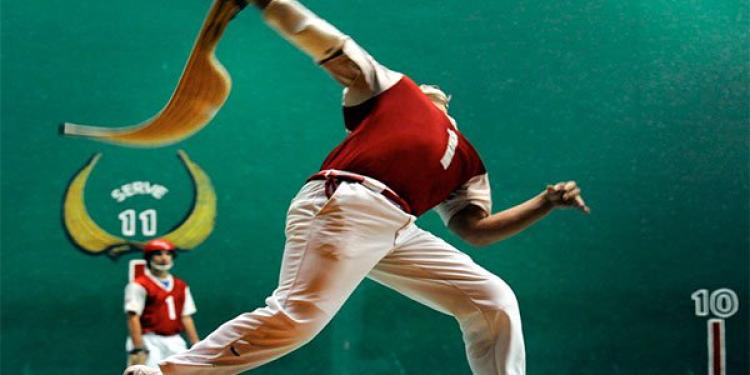Jai alai: The Most Gambled on Unknown Sport
Posted: April 10, 2015
Updated: October 6, 2017

Declared by the Basque Government as the “fastest sport in the world.”
Jai alai, pronounced “hi-hi” is a sport in which a player makes a 125-140 gram ball accelerate using a hand-held device called a cesta, similar to a shortened lacross stick, against a wall at high speeds. The name was first used in 1875 and is called “zesta-punta” meaning basket tip in Basque.
Jai-alai’s originally comes from the Basque region of Northern Spain between the Pyrenees Mountains separating Spain and France. Created 18th century, Jai-alai was played outside against the walls of churches. The game became a main attraction in the annual celebration called Jai-alai or “Merry Festival” in Basque Although the sport was popular, it would be years before it actually made Spanish gambling news.

The first indoor court was built in 1789 in Marquena, Spain. Jai-alai proved a popular sport within Spain. It wasn’t introduced to the U.S until almost a hundred years later at the World’s Fair in St. Louis, Missouri. It was popular enough to gain a small following in more predominately Spanish-speaking areas of the U.S such as Miami. The first professional match was at the Miami Fronton in 1926.
Coming from a distinct culture that’s nestled in the mountains, it’s perfectly logical that Jai-alai has its own specialized equipment. The cesta (Spanish for Basket), is a long, curved basket that’s big enough to hold a ball. Players use the cesta to catch and throw the ball or pelota. The cesta was originally hand-woven for each player’s individual fit. Nowadays, a wicker cesta is used which came from reeds bent around steamed chestnut.
The ball or pelota is about three-quarters the size of a baseball. With layered nylon around a Brazilian rubber core, the pelota is the hardest ball of any sport. Jai-alai is played on a cancha or court with three walls. The front wall which must withstand the initial blow of the pelota is made of granite. Contact with the front wall tends to be the most explosive part of the game attracting those who use online sportsbooks in US.
Similar the racquetball, Jai-alai starts with one player serving the pelota so it lands in a lined area. The opposing player must catch the pelota with the cesta before it hits the ground or after the first bounce and then return it to the wall using their cesta in one motion. A player gains points when their opponent either misses the pelota or sends it out of bounds. Games are played with singles are doubles.
Miami became the home of Jai-Alai in the U.S where many frontons were opened because of its Basque roots. Arenas are mostly in Florida and along the West and East Coast of the U.S whereas International arenas are located in Philippines and Latin America. The sport reached the height of its popularity in the early 1980’s and even appeared in the hit U.S television show “Miami Vice.”
As the eighties progressed the popularity of Jai-alai declined since other gambling options were available after gambling legalization in more states. Some arenas in Connecticut were closed down while the Jai-alai arena in Newport, Rhode Island was converted into slot machine and video lottery terminal parlor. The MGM Grand Hotel and Casino in Las Vegas featured Jai-alai matches but was closed down after 2 years.
According to US gambling laws Florida had to change state legislature in order to prevent Jai-alai arenas from closing down. Averaging a salary of $70,000, over 60% of players today come from the Basque region. Today Jai-alai still creates enough revenue in Miami. In addition to professional players, amateur clubs emerged that offered lessons and attempted to preserve Jai-alai heritage.
Jai alai, pronounced “hi-hi” is a sport in which a player makes a 125-140 gram ball accelerate using a hand-held device called a cesta, similar to a shortened lacross stick, against a wall at high speeds. The name was first used in 1875 and is called “zesta-punta” meaning basket tip in Basque.
• Jai-alai is a sport that originates from the Basque Region of SpainThe Basque Government hails jai alai as “the fastest sport in the world” because of the ball speed. Jai-alai was in the Guinness Book of World Records for the fastest ball speed of 302 kilometer/hour held by Jose Areitio at Newport Jai-alai in Rhode Island. Today many Jai-alai arenas or frontons exist throughout South and North America.
• Jai-alai is considered the fasted sport because of the ball movement.
• Jai-alai was featured on the popular t.v show Miami Vice.
Early Basque beginnings in Jai-alai
Jai-alai’s originally comes from the Basque region of Northern Spain between the Pyrenees Mountains separating Spain and France. Created 18th century, Jai-alai was played outside against the walls of churches. The game became a main attraction in the annual celebration called Jai-alai or “Merry Festival” in Basque Although the sport was popular, it would be years before it actually made Spanish gambling news.

(Photo: Gentlemint)
The first indoor court was built in 1789 in Marquena, Spain. Jai-alai proved a popular sport within Spain. It wasn’t introduced to the U.S until almost a hundred years later at the World’s Fair in St. Louis, Missouri. It was popular enough to gain a small following in more predominately Spanish-speaking areas of the U.S such as Miami. The first professional match was at the Miami Fronton in 1926.
The Basics of the Game
Coming from a distinct culture that’s nestled in the mountains, it’s perfectly logical that Jai-alai has its own specialized equipment. The cesta (Spanish for Basket), is a long, curved basket that’s big enough to hold a ball. Players use the cesta to catch and throw the ball or pelota. The cesta was originally hand-woven for each player’s individual fit. Nowadays, a wicker cesta is used which came from reeds bent around steamed chestnut.
The ball or pelota is about three-quarters the size of a baseball. With layered nylon around a Brazilian rubber core, the pelota is the hardest ball of any sport. Jai-alai is played on a cancha or court with three walls. The front wall which must withstand the initial blow of the pelota is made of granite. Contact with the front wall tends to be the most explosive part of the game attracting those who use online sportsbooks in US.
Similar the racquetball, Jai-alai starts with one player serving the pelota so it lands in a lined area. The opposing player must catch the pelota with the cesta before it hits the ground or after the first bounce and then return it to the wall using their cesta in one motion. A player gains points when their opponent either misses the pelota or sends it out of bounds. Games are played with singles are doubles.
Jai-Alai’s Rise and Fall in Popularity
Miami became the home of Jai-Alai in the U.S where many frontons were opened because of its Basque roots. Arenas are mostly in Florida and along the West and East Coast of the U.S whereas International arenas are located in Philippines and Latin America. The sport reached the height of its popularity in the early 1980’s and even appeared in the hit U.S television show “Miami Vice.”
As the eighties progressed the popularity of Jai-alai declined since other gambling options were available after gambling legalization in more states. Some arenas in Connecticut were closed down while the Jai-alai arena in Newport, Rhode Island was converted into slot machine and video lottery terminal parlor. The MGM Grand Hotel and Casino in Las Vegas featured Jai-alai matches but was closed down after 2 years.
According to US gambling laws Florida had to change state legislature in order to prevent Jai-alai arenas from closing down. Averaging a salary of $70,000, over 60% of players today come from the Basque region. Today Jai-alai still creates enough revenue in Miami. In addition to professional players, amateur clubs emerged that offered lessons and attempted to preserve Jai-alai heritage.
Related content
Subscribe
0 Comments












